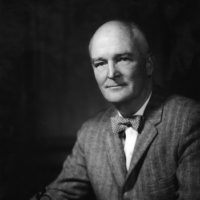
John H. Gibbon Jr.
Jefferson Medical College
For designing and developing the heart-lung machine.
Dr. Gibbon's original experiments in 1935 demonstrated, for the first time, that life could be maintained by a machine, outside the body, which performed all the work of the heart and lungs, without damage to the experimental animal. After 18 long years of experimental engineering and animal work perfecting the original apparatus, Dr. Gibbon performed in May of 1953 the first successful open-heart operation in the world using a heart-lung machine on a human patient. The operation corrected the defective closing of the septum, or wall, between the chambers of the heart.
Since the landmark operation, the use of the heart-lung machine has spread all over the world, and untold numbers of people who would otherwise have remained incapacitated, or died because of previously incurable heart disease, are now living. The historic heart transplant operations performed since December 3, 1967, could not have been possible without Dr. Gibbon's dedicated research.
The vast impact of Dr. Gibbon's discovery on medical science exemplifies the way in which new knowledge, gained from a single research project, can trigger a chain reaction of inquiries leading to additional knowledge, and ultimately to the prevention or cure of human diseases.
For his creative imagination and his perseverance in designing a practical, efficient heart-lung substitute, and for his lifetime dedication to the improvement and advancement of surgery of the heart and blood vessels, this 1968 Albert Lasker Award for Clinical Medical Research is given.
